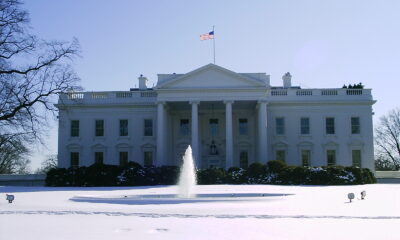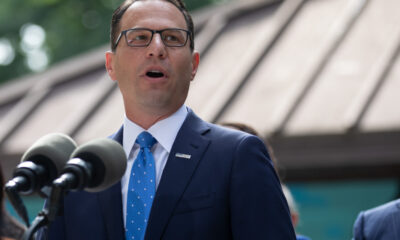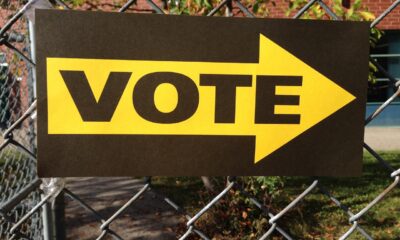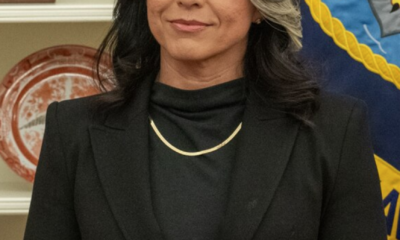Constitution
Elon Musk, the wild card in American politics
Elon Musk has emerged as the wild card in American politics, after California officials drove him out – and he relocated to Texas.
In the high-stakes card game that American politics has become, a wild card has emerged: Elon Musk, entrepreneur – and firebrand. Since he came to this country in the Nineties (acquiring U.S. citizenship in 2002), he has begun a journey that turned him from an agreeable but eccentric and somewhat nerdish inventor and investor, into a figure almost as polarizing as Donald Trump. In that process, he has lately denounced many groups of people he once thought he could work with, for the betterment of humankind, and now realizes are the enemies of humankind. Naturally those enemies want to destroy him, and their efforts succeed only in putting their pettiness on full, embarrassing display. For the moment, he is one of Donald Trump’s staunchest de facto allies (the other is Robert F. Kennedy, Jr.). But future events could turn him into the prime defense contractor for a breakaway Republic of Texas.
The Elon Musk story thus far
The source for the below is his Wikipedia entry. Musk was born in Pretoria, South Africa, in the summer of 1971. In 1989 he emigrated to Canada and became a Canadian citizen through his mother. In 1991 he started college at Queens University at Kingston (Canada), before transferring to the University of Pennsylvania. There he pursued a double major in economics and physics, and graduated in 1995.
After two days at Stanford University, he ceased to rely on college education. So he dropped out and founded his first software company, Zip2. Compaq bought it for $307 million four years later. His next venture was PayPal, which originally was to be the first element in an “everything app,” which he proposed to call X. The online auction site eBay bought PayPal for $1.5 billion in 2002 – the year he became a U.S. citizen.
With that massive stake he founded SpaceX, intending to run his own space program and transplant humans to Mars. At first he sought to buy rockets from Roscosmos – but the Russians laughed at him and told him he was way out of his price league. In the best “oh yeah, we’ll see about that” story, he determined to develop rockets that could go up, come back down – and go up again. And again, and again, and again.
Today he owns or controls Tesla (electric vehicles and solar cells), The Boring Company (tunnel boring), Neuralink (brain-computer interfaces and smart prostheses), and now X (formerly Twitter), in addition to SpaceX.
When did Elon Musk become “an enemy of the (Deep) State”?
For a few years, no one noticed Elon Musk except the few who covered the first-ever private space launch service. All other launch services are government or intergovernmental services, with private contractors and subcontractors in the West. SpaceX, the first one-stop shop from rocket foundry to launch, achieved its first success with Dragon, in 2012. In that same year, Tesla moved out of the luxury sports-car phase and into the high-end business-car space, gradually building models for ever “lower-end” customers.
Elon Musk seems to have decided, at first, that if he left the politicians alone, they’d leave him alone. But the overwrought response to COVID-19 changed that. In 2021, California’s Alameda County refused to recognize Tesla as an “essential business” and ordered its California factory shut down. Tesla refused, sued Alameda County – and won the right to keep its factory open.
The experience showed the world that the “nanny state” didn’t care an unripe fig about humanity. If they did, they’d have left Tesla alone, to further its mission to electrify the small-vehicle fleet. They didn’t – and that could have cause Musk to think again about politics. In any event, he built a larger factory in Texas – and eventually re-headquartered the company in Texas.
That was only the beginning. The Boring Company, SpaceX, Neuralink – and now X – all have their headquarters in Texas.
The X story
That last company is the most fascinating story of all. Elon Musk bought Twitter in 2022, seeking to further freedom of speech. The Deep State, the World Economic Forum, and the institutional investors (BlackRock and Vanguard) that serve both, have hounded him at every step. First they put “poison pill defenses” in place. Ultimately they failed, and Musk walked into Twitter’s San Francisco headquarters carrying a bathroom sink.
He has since fired seventy-five percent of Twitter’s staff, suspecting them of being unproductive. Twitter performance did not suffer one iota. But what really rankles with the left is that he systematically eliminated the most oppressive Twitter Rules. The day after he made his buy official, he revoked Twitter’s “medical misinformation” rules. The long-running Twitter Files series began shortly thereafter – and Elon Musk fired several FBI moles he caught interfering with the series with its first installment. At first he tried cooperating with the platform’s major advertisers – but shed them one by one when he found their demands odious. Now he’s suing them for tortious interference with business.
Things went from bad to worse, and finally California mandated that schools “transition” their pupils without parental knowledge. Musk, who has already lost a son to this “transitioning” movement, reacted in cold fury. That is why X (the former Twitter) now has its headquarters in Texas.
But Musk’s animus is more than personal. Contrary to Deep State propaganda, the world is losing population, and he knows it. Movements like “transgender transitioning” contribute to depopulation.
And now the latest
But Elon Musk’s endorsement of Trump, after the latter nearly lost his life, has put him squarely under attack. In a rally in Butler, Pennsylvania – site of that first attempt on Trump’s life – Elon Musk put the choice of Presidents into stark relief:
We had one President who couldn’t climb a flight of stairs and another who was fist bumping after getting shot!
"We had one President who couldn't climb a flight of stairs and another who was fist bumping after getting shot!" – @ElonMusk #ButlerPA pic.twitter.com/6DEyvVKHn8— Real America's Voice (RAV) (@RealAmVoice) October 5, 2024
His further remarks rankled even worse with the left:
This election…is the most important election of our lifetime.
"THIS ELECTION…IS THE MOST IMPORTANT ELECTION OF OUR LIFETIME." – @ElonMusk #ButlerPA pic.twitter.com/ly1WKdF2ZN— Real America's Voice (RAV) (@RealAmVoice) October 5, 2024
The Second Amendment is there to ensure that we have the First Amendment.
THE SECOND AMENDMENT IS THERE TO ENSURE THAT WE HAVE THE FIRST AMENDMENT." – @ElonMusk #ButlerPA pic.twitter.com/1jkJftP0Fr— Real America's Voice (RAV) (@RealAmVoice) October 5, 2024
The howls of leftist outrage began not more than three days later, with this gem from MSNBC’s Keith Olberman:
Time to cancel all the contracts and reassess his immigration status and hopefully deport him the hell out of the country. And if we can’t do that by conventional means, President Biden, you have presidential immunity, get Elon Musk the F out of our country and do it now.
Keith Olbermann calls on Biden to deport Elon Musk. The Elon Derangement Syndrome is off the charts pic.twitter.com/IBZCFu36ux— Libs of TikTok (@libsoftiktok) October 8, 2024
Olberman clearly didn’t research Musk’s history. If he had, he’d have known that Musk came to the United States from Canada, as a college transfer student. That aside, what likely rankled with Olberman was Tucker Carlson’s interview with Elon Musk.
Elon Musk is all in.
(0:00) Elon Musk Is All in on Donald Trump
(6:35) Providing Starlink to Victims of Hurricane Helene
(9:22) If Trump Loses, This Is the Last Election
(21:49) The Epstein and Diddy Client List
(33:38) Vaccines
(35:49) The Movement to Decriminalize Crime… pic.twitter.com/jNqB1ThqQz— Tucker Carlson (@TuckerCarlson) October 7, 2024
In it, Musk discussed his endorsement of Trump – and also that he knew the names of Jeffrey Epstein’s clients. He is ready to talk as soon as Trump takes office again – and directly implicated Bill Gates.
🚨BREAKING:
Elon Musk just called out the billionaires and celebrities that have come out of the woodworks in support of Kamala Harris.
He said that the only reason they’re doing so is likely due to their implicit involvement with Epstein.
They all know that once Trump takes… pic.twitter.com/B2pQLaOkzZ— Gunther Eagleman™ (@GuntherEagleman) October 7, 2024
One of Epstein’s victims, Virginia Giuffre, has reached out to Musk, saying she has information.
https://twitter.com/VRSVirginia/status/1843864791712137681
About those UFOs
Also in his interview with Carlson, Elon Musk weighed in on one issue that might be relevant – or not. Since the UFO craze has reignited, Musk now says flatly that all such objects are super-secret aircraft prototypes. These could be under American or other national development. “We are the aliens,” Musk said, because he has never seen anything in his work at SpaceX that could legitimately suggest an extrasolar scout craft or probe. If those objects are super-secret prototypes, perhaps several in the Deep State want to keep that hidden.
California interferes with SpaceX – and the Space Force
That aside, last Friday (October 11) the State of California took a decision that interferes directly with SpaceX’ plans. That interference extends to the Space Force as well. At issue is a proposed increased launch cadence from Vandenberg Space Force Base, located in California. According to the Los Angeles Times,the California Coastal Commission has refused permission. And the reason they gave is explicitly political. Chairwoman Caryl Hart and Commissioners Gretchen Newsom (no relation to the governor) and Mike Wilson shared their litany of complaints.
We’re dealing with a company, the head of which has aggressively injected himself into the presidential race. Caryl Hart
This company is owned by the richest person in the world with direct control of what could be the most expansive communications system in the planet. Just last week that person was talking about political retribution. Mike Wilson
Elon Musk is hopping about the country, spewing and tweeting political falsehoods and attacking [the Federal Emergency Management Agency] while claiming his desire to help hurricane victims with free Starlink access to the internet. Gretchen Newsom
That last is a direct reference to the interference into which Musk has run while trying to extend Starlink service to the western part of North Carolina, which still resembles a war zone. In addition to the above, Newsom complained about Musk’s criticism of California’s transgender-friendly policies and its new school secrecy law.
Tellingly, Musk’s current profile on Wikipedia echoes the sentiments of the three commissioners. It speaks of “unscientific and misleading statements, including COVID-19 misinformation” and “right-wing conspiracy theories.”
Space Force officials say they’re still willing to talk to “find a solution.” But realistically, no solution can come, except through a change of administration and Space Force leadership.
Last Sunday Elon Musk successfully conducted Integrated Flight Test 5 of his new “Starship” heavy-lifting rocket. In that test, the autonomous booster returned to the launch pad, and the launch tower caught it in mid-air. Integrated Flight Test 6 will likely take place before the month is out.
What will Elon Musk do next?
Few journalists have noticed the pattern: Elon Musk began as a happy California resident, but now is increasingly becoming a Texas resident. He has steadily moved many of his businesses out of California. That part one can understand, given California’s inherent hostility to business. But why Texas as a place to which to relocate? What does Texas have that other States don’t? It has a long coastline, but that benefits SpaceX only, and he could as easily relocate to Florida.
And that’s why he is a wild card. Surely he cannot fail to have noticed the Texas Nationalist Movement. If by some dark chant, or the most outrageously brazen election cheat in the history of elections, Kamala Harris is elected President, that Movement will “move” forward with plans to seek an immediate resolution of secession. Already, election-integrity activists have told CNAV that they fear that the cheaters need no baseline any longer. “We’re going to lose this election,” said one last night. And Elon Musk is on record favoring discarding electronic voting machines and switching to paper ballots, hand-counted at precinct level.
If Texas secession gains any traction, that will affect Elon Musk, and all his businesses, directly. He has never spoken publicly about Texas secession, but others have speculated on what role he might play. More particularly, he is now in firm position to be the prime defense contractor for a breakaway Republic of Texas.
Depending on the election
If, as more and more influencers suspect, Trump wins the election, Texas secession becomes moot. But Musk will stay in Texas, which is certainly contrarian on matters of federal regulation. Trump will likely either bring the California Coastal Commission to heel, or suggest that Congress sell Vandenberg Space Force Base and buy land next to “Starbase” (the former Boca Chica, Texas) to build its replacement. In that case, Trump would “write off” the American West Coast as under hostile State administrations for the foreseeable future.
But if Harris wins, the country splits. Elon Musk told Tucker Carlson, in that same interview (see above), that a President Harris might send him to prison.
"If Trump loses, I am fuc*3d. How long do you think my prison sentence is gonna be?"
Elon Musk is simply supporting the candidate he believes is best for America’s future. No one can arrest him, regardless of who wins—supporting a candidate is not a crime. pic.twitter.com/xKBLjBbMp9— DogeDesigner (@cb_doge) October 7, 2024
And now one can readily see Musk’s motives. He is preparing to support the secession of Texas in the event of a Democratic victory. Moving his companies to Texas is not a series of “huff moves,” but a carefully calculated strategy. So if Harris wins, expect Musk to appear with TNM President Dan Miller on his next “Late Night Coffee Time” podcast – and Dan Miller to appear with Musk in an “X Space.” And expect the Texas House Committee on State Affairs to take up yet another “Texit Bill.” Perhaps this time, it will pass.
Terry A. Hurlbut has been a student of politics, philosophy, and science for more than 35 years. He is a graduate of Yale College and has served as a physician-level laboratory administrator in a 250-bed community hospital. He also is a serious student of the Bible, is conversant in its two primary original languages, and has followed the creation-science movement closely since 1993.
-

 Accountability2 days ago
Accountability2 days agoWaste of the Day: Principal Bought Lobster with School Funds
-

 Constitution2 days ago
Constitution2 days agoTrump, Canada, and the Constitutional Problem Beneath the Bridge
-

 Executive18 hours ago
Executive18 hours agoHow Relaxed COVID-Era Rules Fueled Minnesota’s Biggest Scam
-

 Civilization18 hours ago
Civilization18 hours agoThe End of Purple States and Competitive Districts
-

 Civilization4 days ago
Civilization4 days agoThe devil is in the details
-

 Executive4 days ago
Executive4 days agoTwo New Books Bash Covid Failures
-

 Civilization3 days ago
Civilization3 days agoThe Conundrum of President Donald J. Trump
-

 Executive4 days ago
Executive4 days agoThe Israeli Lesson Democrats Ignore at Their Peril












